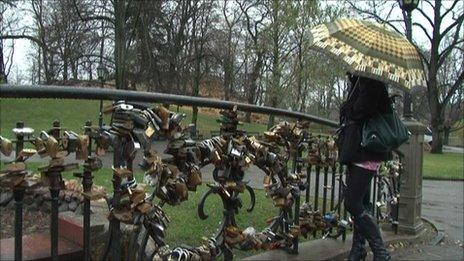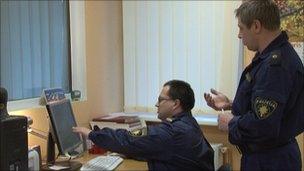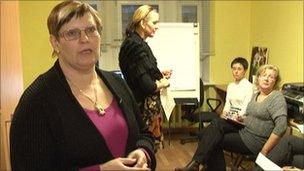Latvia calls on Ireland to tackle sham marriages
- Published

Each of the hundreds of locks symbolises a happy marriage
Every year hundreds of Latvian women, desperate to escape poverty, take part in sham marriages in the Irish Republic with Asian men seeking EU residency rights.
Now the Latvian government is calling on the Irish authorities to clamp down on the scam.
Next to Riga's Old Town, there is a picturesque bridge covered in hundreds of locks.
The locks are engraved with hearts and the names of newlyweds, who come here to throw away the key in the river below for good luck.
Human traffickers
For Anna, 19, whom we have arranged to meet on the bridge, these locks bring back memories of a more dangerous type of wedding.
Anna is not her real name as she fears retribution from human traffickers.
Journalist Aleksandra Jolkina on her undercover experience
A year ago, she and her mother were both trying to survive on around 300 euros a month.
A friend suggested contacts in the Irish Republic who could help find a job. And the friend gave Anna a plane ticket.
When she arrived, however, the work was not what she expected.
"Two Pakistani men met me and took me to a house where I saw a man I was told I was to marry. I was scared," she said.
She was kept locked up in a room for two days before she managed to escape by emailing a Latvian journalist who called the police.
Anna was lucky. Latvian police say other women who refuse to go through with a sham marriage have been physically or sexually abused.
Other women, stranded and penniless, feel they have no choice but to go through with the wedding.
Social networking
Many of the women are recruited online on Latvian social networking sites, often through what look like job ads.

Police say up to 400 Latvian women took part in sham marriages in Ireland in 2009
But usually the only details given are that young women under 30 are needed, and that free accommodation is provided in Ireland for six months - exactly the amount of time it takes to register a new marriage.
Some women only find out about the sham marriage when they arrive in Ireland.
The marriages are conducted there because it is not illegal in the Irish Republic to marry in return for money.
According to Latvia's Ministry for Foreign Affairs, this anomaly is a throwback to a centuries-old Irish tradition of the bride's wedding dowry.
Fake ads
Latvian journalist Aleksandra Jolkina, who's writing a book on the issue, actively went looking for a sham marriage.
She posted fake ads online, saying she was looking for a job abroad.
Within hours she received proposals of marriage in the Irish Republic: all from men from the Indian subcontinent, offering to pay her up to 2,000 euros.
"After I said 'yes I agree', I was provided with tickets to Dublin in a couple of days," she explained.
"They said it's a unique opportunity... and that it's a possibility to earn money and to get a job in Ireland."
But the women do not always realise the dangers of abuse.
And when they come back to Latvia, obtaining a divorce can be difficult.
Psychological damage
To warn young women of the risks, Latvian charity Shelter Safe House is now launching a nationwide campaign.

The charity Shelter Safe House says that some women are betrayed by their own friends or family
According to the charity's director, Sandra Zalcmane, potential brides are recruited not only online but also sometimes by friends or family, so the psychological damage can be long-lasting.
"Usually if someone has been betrayed in this way by those close to them, they find it hard to trust anyone ever again," she said.
Latvian police estimate that last year up to 400 Latvian women took part in sham marriages with Asian men in Ireland.
Even if the marriages are found to be fake, Irish law does not recognise them as victims of human trafficking because the women travelled voluntarily.
This means that the men involved cannot be prosecuted unless other criminal acts are committed.
Latvian police say they are frustrated and want the Irish authorities to check if all marriages with non-EU citizens are genuine. They are also calling for sham marriages to be outlawed.
But according to Irish police spokesman Sergeant Jim Molloy, all suspected cases of marriage in return for EU residency rights are fully investigated.
False imprisonment
Over the past few months, Irish police have intervened in almost 100 such incidents.
The most recent was on October 25th, when police rescued two Latvian women, aged 19 and 25, from a house in Dublin.
Two men are now facing charges of false imprisonment.
Anna, meanwhile, is now studying back in Latvia.
"I want to study and get a good job, so I think it's still possible to make a success of my life."
But with unemployment rates in Latvia among the highest in Europe, other young women are still being lured into fake marriages by the promise of a better life elsewhere.